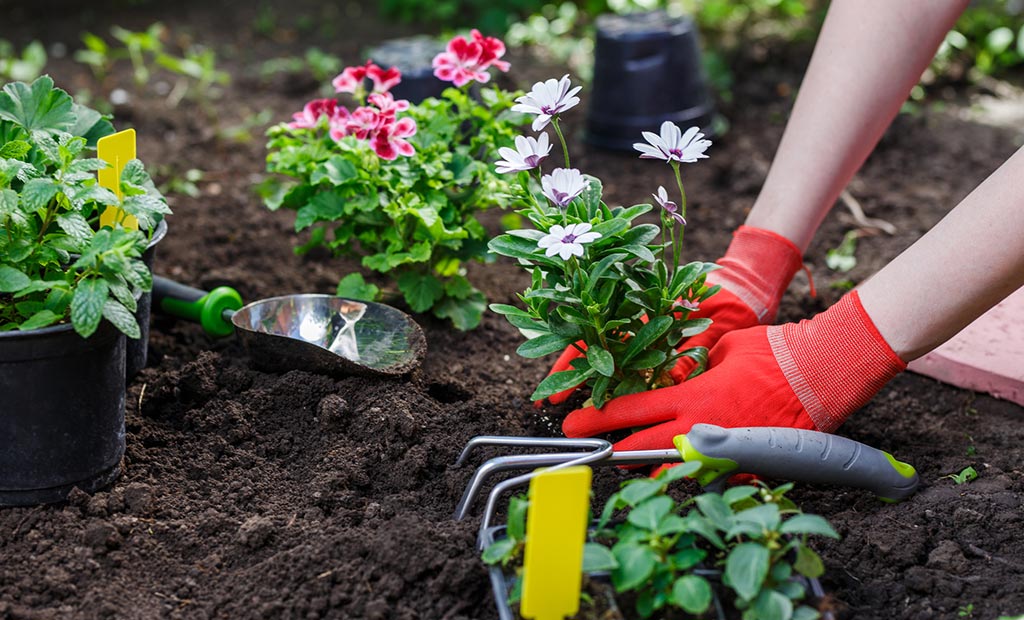Selling home-grown plants and produce not only raises funds for the PTA, but can also strengthen links with the wider community, explains Liz Dobbs.
Focus on what can be offered at key fundraising events and then plan back from there. Most people buy their plants from Easter to early summer, so this is the main time to have plant sales. Once you get into summer, switch to cut flowers, fruits and herbs. Autumn sowing and planting fits in well with school terms and, of course, there are home-grown crafts and gifts right up to Christmas. Here are some suggestions for each term:
Spring
Mother’s Day (22 Mar 2020)
What to offer: Dwarf daffodils in hand-decorated pots.
When to start: Order dry bulbs (previous summer to September) for autumn delivery, and plant up by end of October. A shortcut would be to buy potted-up bulbs wholesale in March and customise them into gifts.
Easter fairs (10-13 April 2020)
What to offer: Hardy potted-up plants such as herbaceous perennials for flower borders or hardy herbs for patio pots.
When to start: Put the word out for donations – ask for named varieties in February as most lifting and dividing is done in March.
Summer
Plant stalls (mid-to-late May)
What to offer: Pots of vegetable and herb plants.
When to start: Obtain seed from January to February for sowing in March in a heated greenhouse. Alternatively, order young plants and pot them up. Note: last order dates are often at the end of January.
Summer fairs (Jun/Jul)
What to offer: English lavender as cut flowers or dried buds.
When to start: Plant in March or ask to harvest from a line of lavender edging a path.
What to offer: Sweet peas as fresh-cut flowers.
When to start: Sow seed in October, February or March.
Autumn
Autumn edibles (Oct)
What to offer: Preserves – jams, jellies, chutneys and pickles.
When to start: Before the summer holidays, ask fruit growers to wash and freeze surplus berries in batches, that way jams and jellies can be made during the autumn term. Surplus veg for chutney and pickles is on offer September and October, ask to take away produce at the end of local veg shows.
What to offer: Fresh fruits – apples from community orchards and ‘Autumn Bliss’ raspberries.
What to offer: Veggie hot food (soup for bonfire nights or curry for quiz nights) using surplus from the veg plot or allotment.
Winter
Christmas fairs (Nov/Dec)
What to offer: Sell Christmas trees from wholesale growers.
When to start: Do your research early. Order by the end of November.
What to offer: Indoor-flowering pot plants.
When to start: Order packs of dry bulbs in August.
What to offer: Festive wreaths and decorations made from evergreen trimmings and berries.
When to start: Collect in November – as close to your event as possible and customise them into gifts.
Quick seed solutions
- Gardeners often sow more than they need – to allow for casualties. They also stagger their sowings. This means there are often spare plants or seed left over – ask around March to June.
- Gardeners often have tins full of unopened packets of seed they don’t need. Seed in unopened foil sachets will still germinate even after several years (check sow-by dates).
- Peas, sweet peas, beetroot and chard are easy to handle, and their sowing times are flexible so they can fit in with term times. So too are broad beans such as ‘Aquadulce’. They are particularly hardy and can be sown in either November or spring. They are early to crop (June) so you can sell seeds, young plants or harvested pods within the academic year. French beans and runner beans are productive and easy to sow, but they are tender and mostly crop in summer.
Beyond the school gates
- In addition to your school garden, there will be keen gardeners in your local community who can help, either with donations or with knowledge. It’s usually just a matter of asking at the right time, although at first you might have to ask when that is! Twitter and Facebook are good ways of linking up with local horticultural businesses and clubs, as well as for drumming up interest in community events.
- A local garden centre or plant nursery might let you have surplus stock, discounts or donations. They might even provide a kids’ gardening club with facilities to pot-up bulbs, etc. It is best not to compete with them directly, therefore, if they donate unsold tulip bulbs in November, it is more diplomatic to plant the bulbs out in rows and harvest as cut flowers in late spring, rather than sell the dry bulbs on. Staff will often support local communities by visiting schools and offering expertise, particularly if an activity is linked to a garden show.
- Garden club members often have more plants than they need, so they will usually donate spares or they might have a productive fruit garden that needs harvesting. Their members could judge plant displays or provide demonstrations at events.
- Allotment holders may donate fruit and veg displayed after local shows, or supply discounted cheap seed and sundries, which they often buy in bulk.
- Community orchards are often very busy in October so if you can help pick fruit or help with fruit pressing, you will usually enjoy donations of fruit that can be turned into pies and cakes.
Have you run a successful plant sale and want to share your story? Drop us an email at editorial@pta.co.uk


.gif)






